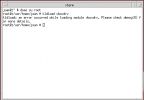Hello,
this is a bit frustrating, I spent more thant 24 hours reading and trying to install VirtualBox in different ways (packages, ports...) but nothing.
I found this website (https://freebsdfoundation.org/resource/using-freebsd-as-a-virtual-host-quick-guide/) and I have an error on the second step (the second!!!).
When I write kldload vboxdrv it says: kldload: an error occurred while loading module vboxdrv. Please check dmesg(8) for more details.
I have FreeBSD 13 amd64.
I installed the package virtualbox-ose and I checked (pkg info virtualbox-ose) and it is for architecture amd64, so everything should work fine.
Could somebody send me a step by step tutorial, please?
this is a bit frustrating, I spent more thant 24 hours reading and trying to install VirtualBox in different ways (packages, ports...) but nothing.
I found this website (https://freebsdfoundation.org/resource/using-freebsd-as-a-virtual-host-quick-guide/) and I have an error on the second step (the second!!!).
When I write kldload vboxdrv it says: kldload: an error occurred while loading module vboxdrv. Please check dmesg(8) for more details.
I have FreeBSD 13 amd64.
I installed the package virtualbox-ose and I checked (pkg info virtualbox-ose) and it is for architecture amd64, so everything should work fine.
Could somebody send me a step by step tutorial, please?


